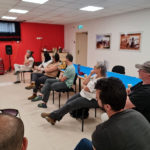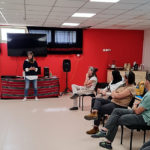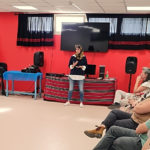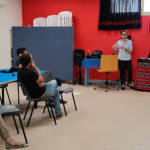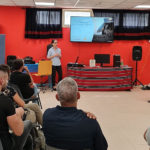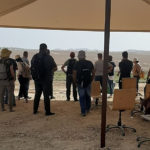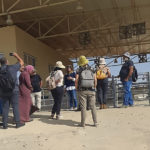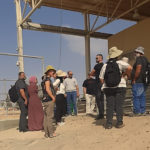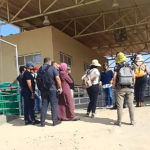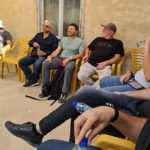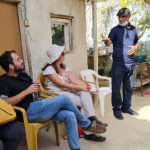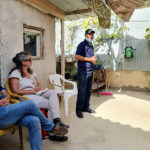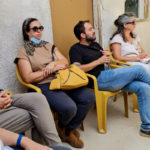SFP environmental and climate justice course tours the Negev
Summary of a day tour of the Negev: the Wadi Attir project and an unrecognized village in the framework of the seventh meeting of the dialogue course for Environmental and Climatic Justice of the School of Peace – Wahat al-Salam / Neve Shalom.
On Friday, October 29 2021, we traveled south for a tour and fascinating encounter with the realities of Bedouin life in the Negev – a topic that is well within the interest area of the course.
The activity was attended by 13 participants: six Jews and seven Palestinians.
We started the day with a visit to the Wadi Attir project, meeting with the project director, Ms. Lina Alatawna, an impressive and strong woman who manages the important work of this impressive work for Bedouin society in particular and the world in general. The project, an initiative involving many participants, comprises a sustainable farm that draws upon both traditional Bedouin culture and progressive ideas. Ms. Alatawna’s introduction impressed us with the project’s quality and scope. The farm includes several components, one of which is for the growing of traditional herbs and herbs under strictly strictly pesticide-free conditions. These are dried and used to make tea melanges, soaps and other products – providing significant employment for local youths and women.
After our tour of this amazing farm, we met with doctoral student Hanin Shibli for a fascinating lecture on “energy poverty” and how the unrecognized status of villages impacts community resilience and public health. The lecture broadened our perspective and helped us better to understand the situation of unrecognized villages.
At the end of this session, we conducted a dialogue based on what we had learned and the feelings it evoked. This short discussion shed further light on the gaps caused by the conflict.
After a rich and successful meal prepared by the cooks of the Wadi Attir project, and after most of us had purchased local produce from the project, we made a short journey to the village of Umm al-Hiran, which is adjacent to the Wadi Atir project and opposite the larger town of Khura.
In Umm al-Hiran, we met with Mr. Abu-Shahita, a representative and member of the village committee, sitting outside his modest home. He told us his personal story mingled with that of his village, which remains unrecognized after 70 years. His story detailed long and exhausting struggles with the state, the authorities and many other bodies, but despite all this, he spoke with humor, optimism and great hope.
Ali and Umm al-Hiran’s story throw into bold relief the impervious nature of a system based on a policy of not wanting to find appropriate and humane solutions that could end the conflict. For an hour and a half, we listened to his story, with fascination and indignation. We emerged speechless, full of appreciation and compassion for those who remain resilient in the face of over-arching injustice, and who continue to struggle for their right to their land and their home.
Ali’s story will require time to digest. It will continue to sink in and accompany us until the next meeting, which is scheduled to take place in two weeks, at the School for Peace.
Credit is due to Harb Amara for coordinating this fascinating and inspiring tour.
Article: Dr. Noa Barkai-Kara.

